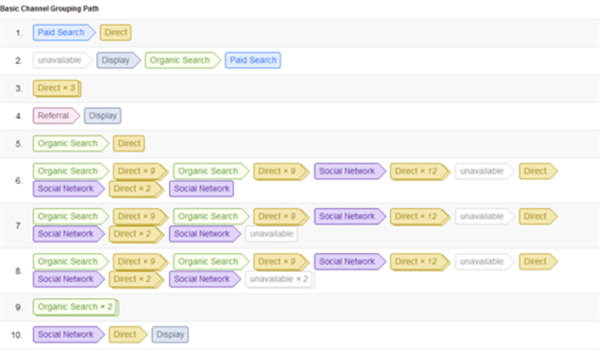Is MTA the Future of Analytics?

by Joe Whyte
16 Jan, 2023
Multi-touch attribution (MTA) sounds complex and unlike most other analytics practices, this one actually is; in the realm of marketing, however, it is definitely where the industry is headed (so hang on tight).
An attribution model assigns a value to different touchpoints along a conversion path (whether toward a purchase, a download or form completion) based on rules set by the marketer and the enterprise that employs them. By analyzing the entire path of a prospect or customer's journey to conversion it is possible to give more weight to channels that assisted in the conversion and get a clearer picture of channel performance.
The path to conversion (as shown in the image below) can involve several different touches on channels including organic search, paid search, social media, email and more.

Multi-touch attribution provides several advantages over last-click attribution; the most significant being that it provides a clearer view of the entire purchasing process, showing individual channel and campaign performance, enabling enterprises to attribute revenue to these channels. At the end of the day, this means more control over marketing budget and results.
Various attribution models are in use and "last click" attribution is the most prevalent currently, but that is about to change if Google has its way. Google has made a commitment to kill last-click attribution and that should concern businesses.
There are many reasons that multi-touch attribution is not more widely adopted (complexity and expense for example) but for many, the whole concept of attribution models is fundamentally flawed. Some of the realizations that enterprise marketers discover as they implement their own attribution models include:
+ Attributed ROI is not true ROI
Many factors go into a company's conversion process like brand equity, word of mouth and traditional advertising. Although MTA allows for attributing revenue to marketing channels, it is incremental. This means the data being collected is not accounted accurately for every dollar that is generated in sales.
+ Attribution does not account for external factors
Attribution does not take into effect seasonality, economic factors, pricing and promotions, which means the data becomes more subjective and less accurate over time.
+ Attributing accurate impact on revenue is somewhat arbitrary
There are several models that may work for a business but at a certain point it is necessary to assign marketing dollars to different channels based on the data that has been put together. It becomes very difficult to do this especially when a channel has very few (or zero) conversions. The best way to navigate through this obstacle is to go dark in a marketing channel to see what influence it has over the others and along the conversion path. At the end of the day, this number is most likely calculated by a weighted formula the user creates, which is an educated guess at best.
Unfortunately, due to the complexity and difficulty of attribution revenue in multi-touch attribution models, businesses may put marketing dollars into channels that serve no real benefit to the conversion path.
The Good News about MTA
There are many solution providers that provide enterprises an opportunity to engage in MTA. Google, for example, offers seven different attribution models (Last Interaction/Click, Last Non-Direct Click, Last AdWords Click, First Interaction, Linear, Time Decay and Position Based) within its Google Analytics product that can be used, but it remains important to know which one best fits the businesses goals.
By looking at these different models it becomes clear which might work best for a client or enterprise. If not, marketers can always create one based on their own set of rules.
Enterprises marketing in multiple channels must examine whether they have an attribution problem. While the industry is making strides to resolve multi-touch attribution issues - so advertisers can get a better understanding of customers' conversion paths - marketers must understand that collecting accurate data is paramount to providing effective recommendations.
Joe Whyte is the founder of Red Wagon Digital, an agency providing digital and traditional marketing.
An attribution model assigns a value to different touchpoints along a conversion path (whether toward a purchase, a download or form completion) based on rules set by the marketer and the enterprise that employs them. By analyzing the entire path of a prospect or customer's journey to conversion it is possible to give more weight to channels that assisted in the conversion and get a clearer picture of channel performance.
The path to conversion (as shown in the image below) can involve several different touches on channels including organic search, paid search, social media, email and more.

Multi-touch attribution provides several advantages over last-click attribution; the most significant being that it provides a clearer view of the entire purchasing process, showing individual channel and campaign performance, enabling enterprises to attribute revenue to these channels. At the end of the day, this means more control over marketing budget and results.
Various attribution models are in use and "last click" attribution is the most prevalent currently, but that is about to change if Google has its way. Google has made a commitment to kill last-click attribution and that should concern businesses.
There are many reasons that multi-touch attribution is not more widely adopted (complexity and expense for example) but for many, the whole concept of attribution models is fundamentally flawed. Some of the realizations that enterprise marketers discover as they implement their own attribution models include:
+ Attributed ROI is not true ROI
Many factors go into a company's conversion process like brand equity, word of mouth and traditional advertising. Although MTA allows for attributing revenue to marketing channels, it is incremental. This means the data being collected is not accounted accurately for every dollar that is generated in sales.
+ Attribution does not account for external factors
Attribution does not take into effect seasonality, economic factors, pricing and promotions, which means the data becomes more subjective and less accurate over time.
+ Attributing accurate impact on revenue is somewhat arbitrary
There are several models that may work for a business but at a certain point it is necessary to assign marketing dollars to different channels based on the data that has been put together. It becomes very difficult to do this especially when a channel has very few (or zero) conversions. The best way to navigate through this obstacle is to go dark in a marketing channel to see what influence it has over the others and along the conversion path. At the end of the day, this number is most likely calculated by a weighted formula the user creates, which is an educated guess at best.
Unfortunately, due to the complexity and difficulty of attribution revenue in multi-touch attribution models, businesses may put marketing dollars into channels that serve no real benefit to the conversion path.
The Good News about MTA
There are many solution providers that provide enterprises an opportunity to engage in MTA. Google, for example, offers seven different attribution models (Last Interaction/Click, Last Non-Direct Click, Last AdWords Click, First Interaction, Linear, Time Decay and Position Based) within its Google Analytics product that can be used, but it remains important to know which one best fits the businesses goals.
By looking at these different models it becomes clear which might work best for a client or enterprise. If not, marketers can always create one based on their own set of rules.
Enterprises marketing in multiple channels must examine whether they have an attribution problem. While the industry is making strides to resolve multi-touch attribution issues - so advertisers can get a better understanding of customers' conversion paths - marketers must understand that collecting accurate data is paramount to providing effective recommendations.
Joe Whyte is the founder of Red Wagon Digital, an agency providing digital and traditional marketing.

Joe Whyte
Joe Whyte, CEO and Founder of Red Wagon Agency, is a seasoned marketer and entrepreneur with a diverse background in various marketing tactics. He is the author of three best-selling books on business growth and digital marketing, and the host of the podcast "Tra-digital Academy". As the owner and founder of Red Wagon Agency, Joe is an expert in marketing strategies and campaigns, marketing automation, customer lifecycle management, and much more. With extensive experience in project management, product positioning, web and print content development, and public and media relations, Joe is dedicated to helping businesses achieve their full potential through effective marketing and sales tactics.








